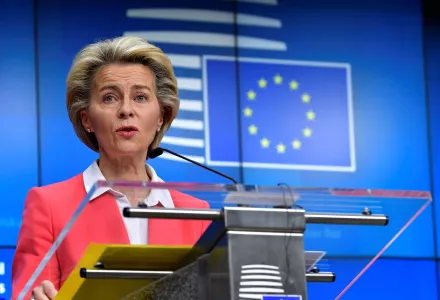Article

Our weekly COVID-19 and Economic Diplomacy tracker looks at policies that impact the coordination of international governments and central banks, ongoing commentary and analysis, and asks what these turbulent times mean for economic diplomacy.
We’d love to hear what you think. Send us your comments, and be sure to follow us on Twitter @BelferEDI.
The Highlights
- The U.S. Treasury has only allocated $195B of an earned $454B of Fed backed loan programs.
- Eurozone governments will rack up €976B in fiscal deficits, equal to 8.9% of GDP this year.
- The Chinese economy grew 4.9% in the third quarter and is on track to grow 2% by the end of this year. It will be the only major economy to grow this year.
Global Developments
- The OECD stated that the pandemic has ended a decade’s growth in the flow of migration globally while leaving foreign-born workers at much greater risk of infection, unemployment, and educational disadvantage. Immigrant families account for more than 20% of people across 37 economies; however, the number of residency permits granted by OECD countries in the first half of 2020 was less than half the level seen a year earlier. Existing migrants have been harder hit by the pandemic than the native-born. Immigrants face an infection risk at least twice as high as the native-born and in almost all countries are more likely to become unemployed. The halted flow of migration and the pandemic’s unequal effect on migrant populations affect foreign economies as global remittances decline.
U.S. Developments
- Lael Brainard warned that economic disparities threaten to undermine U.S. recovery. Brainard called on Congress and the White House to provide more fiscal support and reinforced the Fed’s commitment to loose monetary policy. Fed officials have repeatedly called for a new stimulus bill but Brainard’s remarks are the most detailed and pointed in highlighting the danger of widening disparities and the need for additional assistance for unemployed workers, small businesses, and state and local governments. She stated that “apart from the course of the virus itself, the most significant downside risk to my outlook would be the failure of additional fiscal support to materialize.”
- The White House and congressional Democrats continue to keep negotiations on a new fiscal stimulus bill alive, though the possibility of a bill passing Congress before the election remains unlikely. A potential agreement is expected to be worth up to $2T and include a new round of direct payments to families and additional funding for jobless benefits and small business relief. Worker safety and state and local government aid remain a point of contention. If no deal is reached by November 3, the outcome of the presidential race will likely determine whether a stimulus package will emerge.
- Congress earmarked $454B for the Treasury to back Fed loan programs; the Treasury has only allocated $195B. The programs supported by this insurance have made just $20B in loans, far less than the suggested trillions. Part of the reason for the failure of these programs is that the markets calmed once the Fed said it would intervene, making the programs less necessary as credit began to flow again. Moreover, the Fed, which has extended its authorities into new markets, is not designed to hand out the sort of loans Congress envisioned.
European Developments
- Eurozone governments will rack up deficits close to €1T as they increase spending to combat the economic impact of the pandemic. According to Financial Times calculations of draft budget plans, the eurozone will slide to an aggregate fiscal deficit of €976B equal to 8.9% of GDP this year. Governments estimated deficits would remain high in 2021 with expected aggregate shortfall to be under €700B or 6% of GDP. However, investors and policymakers alike are nonplussed about government spending and debt levels, indicative of a shift in attitude from supporting austerity to heavy borrowing.
- The European Fiscal Board called for EU countries to address weaknesses in the bloc’s Stability and Growth Pact before reapplying the currently suspended fiscal rules. The European Commission used a so-called escape clause to suspend the enforcement of the SGP, which imposes a 60% debt-to-GDP ceiling, due to the economic crisis caused by the pandemic. The Commission delayed a review of the controversial SGP with countries debating how to rewrite it.
Emerging Markets
- The Chinese economy expanded 4.9% in the third quarter with industrial growth powering its economic recovery. Though GDP expansion fell short of expectations, it was well ahead of the 3.2% increase in the second quarter. The state-backed industrial boom has led to industrial production increasing 6.9% in September, which is the same rate as in December before the virus outbreak. Retail sales rose 3.3% last month, their best performance this year. According to Eswar Prasad of Cornell University, “China is likely to be the sole major economy in the world to register positive growth this year.” China’s central bank governor estimated that the Chinese government will likely grow 2% this year.
Odds and Ends
- Nicole Bateman and Martha Ross write for Brookings on why COVID-19 has been especially harmful for working women.
- Kevin Rudd argues in an oped for Project Syndicate that governments should increase foreign development spending during the pandemic to help emerging and developing economies.
- Emily Stewart writes in Vox how the U.S. gave up on fighting the pandemic and saving the economy.
- Raphael Bostic, Atlanta Fed President, stated that the Fed has an important role to play in addressing economic inequalities and disparities. He argues that “we [the Fed] need to participate in a deeper, more creative reckoning with a history of racial injustice that continues to weaken the economy for all of us.”
- The Atlanta, Boston, and Minneapolis Feds have partnered to create a webinar series on racism and the economy. You can watch the first webinar here.
- Jason Furman outlines for the Peterson Institute for International Economics the key priorities for economic policy for the next administration.
Recommended citation
Suh, Hannah. “This Week in COVID-19 and Economic Diplomacy: ‘Eurozone Fiscal Deficit Nears €1T’.” October 22, 2020


